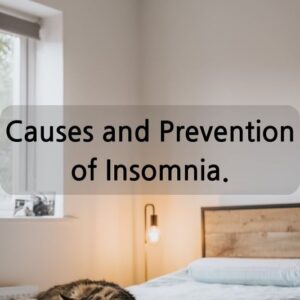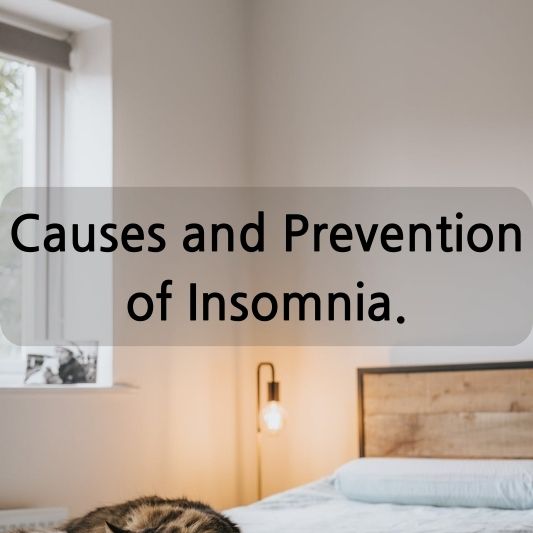Introduction to Insomnia
In today’s fast-paced world, sleeplessness has become increasingly prevalent. Insomnia, the inability to fall asleep or stay asleep, impacts millions worldwide. Understanding its causes and implementing preventive measures is crucial for a restful and rejuvenating sleep.

Understanding Insomnia
Types of Insomnia
Insomnia manifests in various forms, including transient, acute, and chronic. Transient insomnia lasts for a few nights, often due to stress or changes in environment. Acute insomnia is short-term but recurrent, while chronic insomnia persists for weeks or longer, impacting daily life.
Symptoms and Signs
Identifying insomnia involves recognizing symptoms such as difficulty falling asleep, frequent wake-ups during the night, waking up too early, fatigue, irritability, and impaired concentration during the day.
Causes of Insomnia
Psychological Factors
Psychological factors like stress, anxiety, depression, and trauma can trigger or exacerbate insomnia. Racing thoughts or emotional distress often interfere with falling asleep, leading to a disrupted sleep cycle.
Medical Conditions
Certain medical conditions such as chronic pain, asthma, arthritis, and neurological disorders contribute to sleep disturbances. Medications for these conditions might also disrupt sleep patterns.
Lifestyle and Environmental Factors
Unhealthy sleep habits, excessive caffeine intake, irregular work schedules, and exposure to electronic screens before bedtime disrupt the body’s natural sleep-wake cycle. Environmental factors like noise, light, and uncomfortable sleeping conditions can also hinder sleep quality.
The Impact of Insomnia
Physical Health
Chronic insomnia poses serious health risks, including cardiovascular issues, weakened immune system, obesity, and increased risk of diabetes. Sleep is vital for bodily repair and maintenance, and inadequate rest negatively impacts overall health.
Mental Well-being
Sleep deprivation affects mental health, leading to increased irritability, mood swings, anxiety, and even depression. It impairs cognitive functions, affecting decision-making, memory, and concentration.
Prevention Techniques
Establishing a Sleep Routine
Maintaining a consistent sleep schedule, avoiding naps during the day, and establishing bedtime rituals signal the body to wind down, promoting better sleep quality.
Creating a Relaxing Environment
A calm and comfortable sleep environment, free from distractions and conducive to relaxation, encourages restful sleep. Dimming lights, reducing noise, and optimizing room temperature support a tranquil atmosphere.
Dietary and Lifestyle Changes
Limiting caffeine and alcohol intake, especially before bedtime, and adopting a balanced diet aid in regulating sleep patterns. Regular exercise during the day promotes better sleep quality.
Seeking Professional Help
Therapies and Treatments
Cognitive-behavioral therapy (CBT) helps in addressing thought patterns and behaviors impacting sleep. Relaxation techniques, meditation, and yoga also aid in improving sleep quality.
Medication and Alternatives
In certain cases, physicians may prescribe sleep aids or supplements. However, these should be used cautiously and as a last resort due to potential side effects and dependency issues.
Conclusion
Understanding the causes and implementing preventive measures for insomnia are fundamental for a healthier lifestyle. By addressing underlying factors, establishing healthy sleep habits, and seeking professional guidance when needed, individuals can significantly improve their sleep quality and overall well-being.
FAQs about Insomnia
Is insomnia always caused by stress?
Insomnia can be triggered by various factors, with stress being a significant contributor. However, it’s not the sole cause. Other factors like medical conditions, lifestyle choices, and environmental factors also play roles in disrupting sleep patterns.
Can insomnia be cured completely?
While complete eradication of insomnia might be challenging for some individuals, it can be effectively managed and improved through lifestyle changes, therapy, and proper sleep hygiene practices. Consistency and adopting healthy habits often alleviate its impact significantly.
How does diet affect sleep quality?
Diet plays a crucial role in sleep quality. Consuming heavy meals before bedtime can hinder digestion and disrupt sleep. Additionally, caffeine, alcohol, and sugary foods close to bedtime can negatively affect the ability to fall asleep and the quality of sleep.
Are there natural remedies for insomnia?
Yes, several natural remedies can aid in improving sleep quality. These include herbal teas like chamomile or valerian root, practicing relaxation techniques such as deep breathing exercises or meditation, and maintaining a consistent sleep schedule.
When should one seek professional help for insomnia?
Seeking professional help is advisable when insomnia becomes chronic, significantly affects daily life, or persists despite implementing lifestyle changes. A healthcare professional can offer tailored advice, therapies, or medications if necessary, based on individual circumstances.
Find out the price of nutritional supplements to help with insomnia on iHerb!
